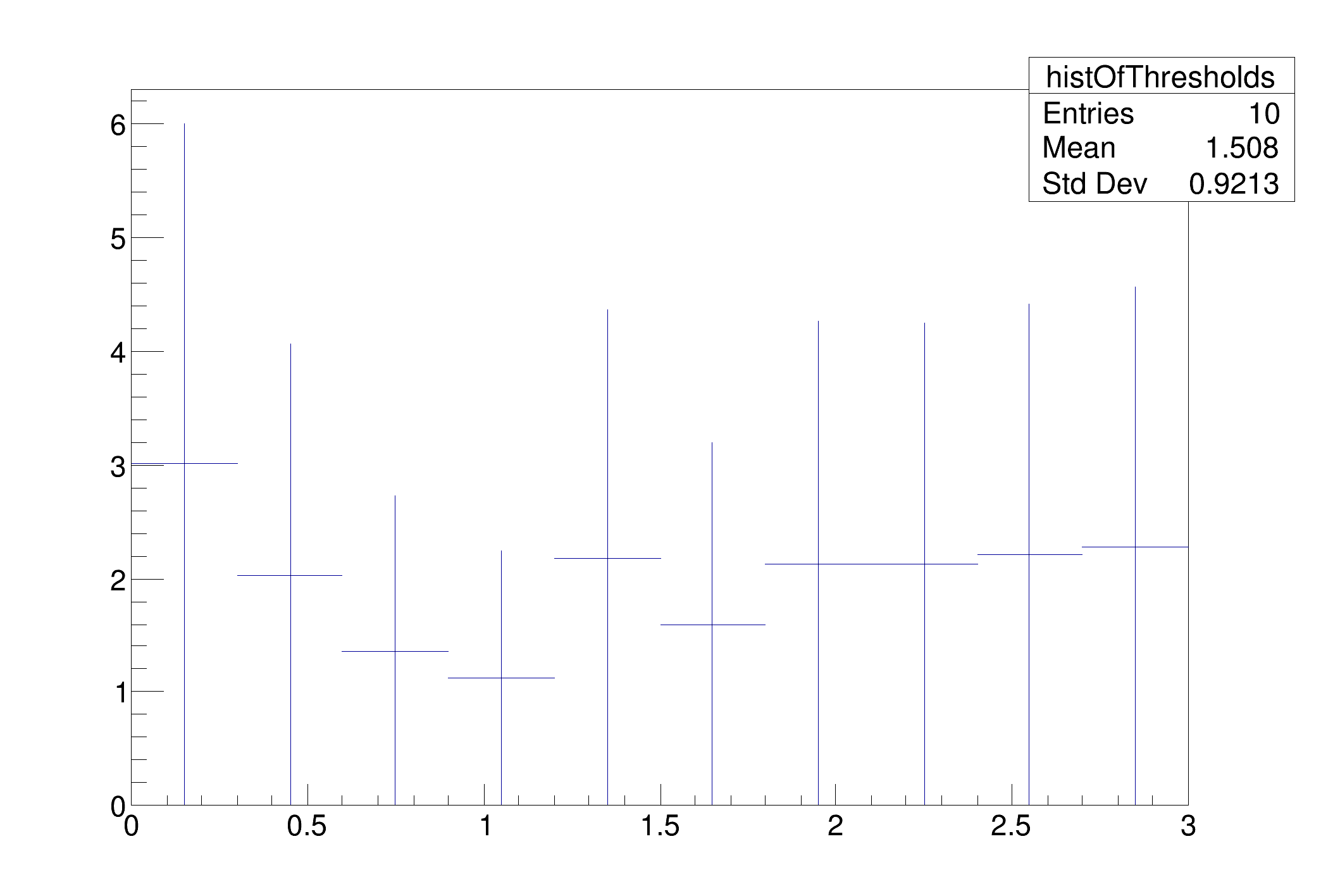With default parameters the macro will attempt to run the standard hist2workspace example and read the ROOT file that it produces.
The actual heart of the demo is only about 10 lines long.
The FeldmanCousins tools is a classical frequentist calculation based on the Neyman Construction. The test statistic can be generalized for nuisance parameters by using the profile likelihood ratio. But unlike the ProfileLikelihoodCalculator, this tool explicitly builds the sampling distribution of the test statistic via toy Monte Carlo.
␛[1mRooFit v3.60 -- Developed by Wouter Verkerke and David Kirkby␛[0m
Copyright (C) 2000-2013 NIKHEF, University of California & Stanford University
All rights reserved, please read http://roofit.sourceforge.net/license.txt
=== Using the following for ModelConfig ===
Observables: RooArgSet:: = (obs_x_channel1,weightVar,channelCat)
Parameters of Interest: RooArgSet:: = (SigXsecOverSM)
Nuisance Parameters: RooArgSet:: = (alpha_syst2,alpha_syst3,gamma_stat_channel1_bin_0,gamma_stat_channel1_bin_1)
Global Observables: RooArgSet:: = (nom_alpha_syst2,nom_alpha_syst3,nom_gamma_stat_channel1_bin_0,nom_gamma_stat_channel1_bin_1)
PDF: RooSimultaneous::simPdf[ indexCat=channelCat channel1=model_channel1 ] = 0.174888
FeldmanCousins: ntoys per point: adaptive
FeldmanCousins: nEvents per toy will fluctuate about expectation
FeldmanCousins: Model has nuisance parameters, will do profile construction
FeldmanCousins: # points to test = 10
lookup index = 0
NeymanConstruction: Prog: 1/10 total MC = 78 this test stat = 1.323
SigXsecOverSM=0.15 alpha_syst2=0.602204 alpha_syst3=0.227781 gamma_stat_channel1_bin_0=1.03121 gamma_stat_channel1_bin_1=1.04626 [-1e+30, 3.00321] in interval = 1
NeymanConstruction: Prog: 2/10 total MC = 78 this test stat = 0.62223
SigXsecOverSM=0.45 alpha_syst2=0.398364 alpha_syst3=0.161337 gamma_stat_channel1_bin_0=1.02058 gamma_stat_channel1_bin_1=1.03265 [-1e+30, 2.02972] in interval = 1
NeymanConstruction: Prog: 3/10 total MC = 78 this test stat = 0.185526
SigXsecOverSM=0.75 alpha_syst2=0.208894 alpha_syst3=0.0960207 gamma_stat_channel1_bin_0=1.01066 gamma_stat_channel1_bin_1=1.01935 [-1e+30, 1.36211] in interval = 1
NeymanConstruction: Prog: 4/10 total MC = 78 this test stat = 0.00588509
SigXsecOverSM=1.05 alpha_syst2=0.0280678 alpha_syst3=0.0367739 gamma_stat_channel1_bin_0=1.0014 gamma_stat_channel1_bin_1=1.00625 [-1e+30, 1.11847] in interval = 1
NeymanConstruction: Prog: 5/10 total MC = 78 this test stat = 0.0747855
SigXsecOverSM=1.35 alpha_syst2=-0.14426 alpha_syst3=-0.0333676 gamma_stat_channel1_bin_0=0.99286 gamma_stat_channel1_bin_1=0.994142 [-1e+30, 2.18053] in interval = 1
NeymanConstruction: Prog: 6/10 total MC = 78 this test stat = 0.38368
SigXsecOverSM=1.65 alpha_syst2=-0.306403 alpha_syst3=-0.0939379 gamma_stat_channel1_bin_0=0.985118 gamma_stat_channel1_bin_1=0.981397 [-1e+30, 1.59882] in interval = 1
NeymanConstruction: Prog: 7/10 total MC = 78 this test stat = 0.924288
SigXsecOverSM=1.95 alpha_syst2=-0.45999 alpha_syst3=-0.155748 gamma_stat_channel1_bin_0=0.977832 gamma_stat_channel1_bin_1=0.96943 [-1e+30, 2.13401] in interval = 1
NeymanConstruction: Prog: 8/10 total MC = 78 this test stat = 1.68871
SigXsecOverSM=2.25 alpha_syst2=-0.601904 alpha_syst3=-0.21612 gamma_stat_channel1_bin_0=0.971077 gamma_stat_channel1_bin_1=0.957715 [-1e+30, 2.12322] in interval = 1
NeymanConstruction: Prog: 9/10 total MC = 234 this test stat = 2.66932
SigXsecOverSM=2.55 alpha_syst2=-0.732241 alpha_syst3=-0.275902 gamma_stat_channel1_bin_0=0.964738 gamma_stat_channel1_bin_1=0.946434 [-1e+30, 2.20603] in interval = 0
NeymanConstruction: Prog: 10/10 total MC = 234 this test stat = 3.85849
SigXsecOverSM=2.85 alpha_syst2=-0.851873 alpha_syst3=-0.333983 gamma_stat_channel1_bin_0=0.958838 gamma_stat_channel1_bin_1=0.935421 [-1e+30, 2.28476] in interval = 0
[#1] INFO:Eval -- 8 points in interval
95% interval on SigXsecOverSM is : [0.15, 2.25]
void StandardFeldmanCousinsDemo(const char *infile = "", const char *workspaceName = "combined",
const char *modelConfigName = "ModelConfig", const char *dataName = "obsData")
{
const char *filename = "";
if (!strcmp(infile, "")) {
filename = "results/example_combined_GaussExample_model.root";
if (!fileExist) {
#ifdef _WIN32
cout << "HistFactory file cannot be generated on Windows - exit" << endl;
return;
#endif
cout << "will run standard hist2workspace example" << endl;
gROOT->ProcessLine(
".! prepareHistFactory .");
gROOT->ProcessLine(
".! hist2workspace config/example.xml");
cout << "\n\n---------------------" << endl;
cout << "Done creating example input" << endl;
cout << "---------------------\n\n" << endl;
}
} else
filename = infile;
cout << "StandardRooStatsDemoMacro: Input file " << filename << " is not found" << endl;
return;
}
if (!w) {
cout << "workspace not found" << endl;
return;
}
ModelConfig *mc = (ModelConfig *)w->
obj(modelConfigName);
if (!data || !mc) {
cout << "data or ModelConfig was not found" << endl;
return;
}
FeldmanCousins
fc(*data, *mc);
fc.SetConfidenceLevel(0.95);
fc.UseAdaptiveSampling(
true);
if (!mc->GetPdf()->canBeExtended()) {
fc.FluctuateNumDataEntries(
false);
else
cout << "Not sure what to do about this model" << endl;
}
PointSetInterval *interval =
fc.GetInterval();
ConfidenceBelt *belt =
fc.GetConfidenceBelt();
cout <<
"\n95% interval on " << firstPOI->
GetName() <<
" is : [" << interval->LowerLimit(*firstPOI) <<
", " << interval->UpperLimit(*firstPOI) << "] " << endl;
double arMax = belt->GetAcceptanceRegionMax(*tmpPoint);
double arMin = belt->GetAcceptanceRegionMax(*tmpPoint);
histOfThresholds->
Fill(poiVal, arMax);
}
histOfThresholds->
Draw();
}
R__EXTERN TSystem * gSystem
static struct mg_connection * fc(struct mg_context *ctx)
RooAbsData is the common abstract base class for binned and unbinned datasets.
virtual Int_t numEntries() const
virtual Double_t getMax(const char *name=0) const
Get maximum of currently defined range.
virtual Double_t getMin(const char *name=0) const
Get miniminum of currently defined range.
RooArgSet is a container object that can hold multiple RooAbsArg objects.
Double_t getRealValue(const char *name, Double_t defVal=0, Bool_t verbose=kFALSE) const
Get value of a RooAbsReal stored in set with given name.
virtual TObject * clone(const char *newname) const
RooDataSet is a container class to hold unbinned data.
virtual const RooArgSet * get(Int_t index) const
Return RooArgSet with coordinates of event 'index'.
RooRealVar represents a fundamental (non-derived) real valued object.
The RooWorkspace is a persistable container for RooFit projects.
RooAbsData * data(const char *name) const
Retrieve dataset (binned or unbinned) with given name. A null pointer is returned if not found.
void Print(Option_t *opts=0) const
Print contents of the workspace.
TObject * obj(const char *name) const
Return any type of object (RooAbsArg, RooAbsData or generic object) with given name)
A ROOT file is a suite of consecutive data records (TKey instances) with a well defined format.
static TFile * Open(const char *name, Option_t *option="", const char *ftitle="", Int_t compress=ROOT::RCompressionSetting::EDefaults::kUseGeneralPurpose, Int_t netopt=0)
Create / open a file.
1-D histogram with a float per channel (see TH1 documentation)}
virtual Int_t Fill(Double_t x)
Increment bin with abscissa X by 1.
virtual void SetMinimum(Double_t minimum=-1111)
virtual void Draw(Option_t *option="")
Draw this histogram with options.
virtual const char * GetName() const
Returns name of object.
virtual Bool_t AccessPathName(const char *path, EAccessMode mode=kFileExists)
Returns FALSE if one can access a file using the specified access mode.
Template specialisation used in RooAbsArg:
Namespace for the RooStats classes.



 Standard demo of the Feldman-Cousins calculator StandardFeldmanCousinsDemo
Standard demo of the Feldman-Cousins calculator StandardFeldmanCousinsDemo 